National ID system comes a step closer to reality after 'plan for biometric database of all Americans' is revealed in immigration bill under review in the Senate
By Leslie Larson|
The immigration bill under review by the Senate Judiciary Committee could mandate the creation of a national biometric database to identify residents in the U.S.
The technology referred to simply as a 'photo tool,' in the proposed legislation presented on Thursday, would be used to verify the identity of employees before they were hired to ensure they were in the country legally.
Privacy experts have sounded the alarm that the national database would further usher in the era of 'Big Brother' government by allowing authorities to track residents, described by one analyst as 'a government version of Foursquare.'

Identification: The immigration bill under
review by the Senate could mandate the creation of a national biometric
database (pictured a passenger uses a new biometric scanner at the
airport in in Houston, Texas)

Alarm: Privacy experts fear the technology would
become increasingly required for ordinary activities like boarding a
plane, buying a house or attending a sporting events
'The Secretary shall develop and maintain a photo tool that enables employers to match the photo on a covered identity document provided to the employer to a photo maintained by a U.S. Citizenship and Immigration Services database,' the legislation reads.
The 'photo tool' is only mentioned in the legislation to be used by an employer to verify the identity of an individual seeking employment.
In this proposed database, the government would amalgamate names, ages, Social Security numbers and photographs of individuals in the U.S., connected to their driver’s license or other state-issued photo ID.

Fear: Privacy experts warn the database could
allow the government to have detailed information about an individual's
movements, like the Big Brother depicted by Tom Cruise's character in
FOX's Minority Report
Biometrics simply refers to the process of identifying humans by various characteristics or traits.
Then the identity verification could become a necessary step to prove one's identity before ordinary activities, like opening a bank account, buying a car or boarding a plane, David Kravets from Wired Magazine suggested.
'Think of it as a government version of Foursquare, with Big Brother cataloging every check-in,' he wrote.
Chris Calabrese, a congressional lobbyist with the American Civil Liberties Union, told Wired that this measure could 'change the relationship between the citizen and state, you do have to get permission to do things. More fundamentally, it could be the start of keeping a record of all things.'
Mr Calabrese says even though the legislation only calls for the tool to be used for employment purposes, it could likely become more commonplace.
He notes that originally the Social Security card was issued to track government retirement benefits but is now required on an array of applications.

Legislation: The Senate Judiciary Committee
began reviewing the immigration reform bill on Thursday (pictured Sen.
Chuck Schumer, left, Sen. Orrin G. Hatch, center, and Sen. Chuck
Grassley, right)
The panel of 10 Democrats and eight Republicans has begun work on the amendment process, and will consider more than 300 proposed modifications to the bill over the new few weeks.
Four Democratic and four Republican senators worked on the immigration reform measures.
The 844-page legislation was crafted over the course of several months during closed-door negotiations between a bi-partisan body referred to as the Gang of Eight.
The group consists of Republican Senators Jeff Flake of Arizona, Lindsey Graham of South Carolina, Marco Rubio from Florida, and John McCain of Arizona.
Senators Dick Durbin of Illinois, Robert Menendez of New Jersey, Michael Bennet of Colorado and Chuck Schumer of New York represented the Democrats.
No comments:
Post a Comment